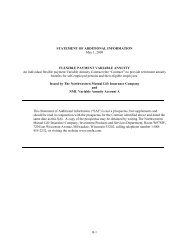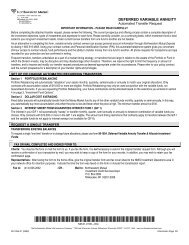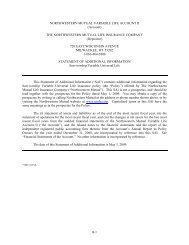B-1 STATEMENT OF ADDITIONAL INFORMATION Dated May 1 ...
B-1 STATEMENT OF ADDITIONAL INFORMATION Dated May 1 ...
B-1 STATEMENT OF ADDITIONAL INFORMATION Dated May 1 ...
Create successful ePaper yourself
Turn your PDF publications into a flip-book with our unique Google optimized e-Paper software.
determined by those investment committee(s) from time to time. Various proxy voting committeesspecialize in regional mandates and review the proxies of portfolio companies within their mandates. Theproxy voting committees are typically comprised primarily of members of CGTC’s and its institutionalaffiliates’ investment committees and their activity is subject to oversight by those committees.CGTC seeks to vote all of its clients’ proxies. In certain circumstances, CGTC may decide not to vote aproxy because the costs of voting outweigh the benefits to its clients (e.g., when voting could lead toshare blocking where CGTC wishes to retain flexibility to trade shares). In addition, proxies with respectto securities on loan through client directed lending programs are not available to CGTC to vote andtherefore are not voted.CGTC will periodically review voting reports to ascertain, where possible, that votes were cast inaccordance with voting instructions.Proxy Voting GuidelinesCGTC has developed proxy voting guidelines that reflect its general position and practice on variousissues. To preserve the ability of decision makers to make the best decision in each case, these guidelinesare intended only to provide context and are not intended to dictate how the issue must be voted. Theguidelines are reviewed and updated as necessary, but at least annually, by the appropriate proxy votingand investment committees.CGTC’s general positions related to corporate governance, capital structure, stock option andcompensation plans and social and corporate responsibility issues are reflected below.• Corporate governance. CGTC supports strong corporate governance practices. It generally votesagainst proposals that serve as anti-takeover devices or diminish shareholder rights, such aspoison pill plans and supermajority vote requirements, and generally supports proposals thatencourage responsiveness to shareholders, such as initiatives to declassify the board or establish amajority voting standard for the election of the board of directors. Mergers and acquisitions,reincorporations and other corporate restructurings are considered on a case-by-case basis, basedon the investment merits of the proposal.• Capital structure. CGTC generally supports increases to capital stock for legitimate financingneeds. It generally does not support changes in capital stock that can be used as anti-takeoverdevices, such as the creation of or increase in blank-check preferred stock or of a dual classcapital structure with different voting rights.• Stock-related compensation plans. CGTC supports the concept of stock-related compensationplans as a way to align employee and shareholder interests. However, plans that include featureswhich undermine the connection between employee and shareholder interests generally are notsupported. When voting on proposals related to new plans or changes to existing plans, CGTCconsiders, among other things, the following information, to the extent it is available: the exerciseprice of the options, the size of the overall plan and/or the size of the increase, the historicaldilution rate, whether the plan permits option repricing, the duration of the plan, and the needs ofthe company. Additionally, CGTC supports option expensing in theory and will generallysupport shareholder proposals on option expensing if such proposal language is non-binding anddoes not require the company to adopt a specific expensing methodology.• Corporate social responsibility. CGTC votes on these issues based on the potential impact to thevalue of its clients’ investment in the portfolio company.Special Review ProceduresIf a research analyst has a personal conflict in making a voting recommendation on a proxy issue, he orshe must disclose such conflict, along with his or her recommendation. If a member of the proxy votingcommittee has a personal conflict in voting the proxy, he or she must disclose such conflict to theappropriate proxy voting committee and must not vote on the issue.B-124
















